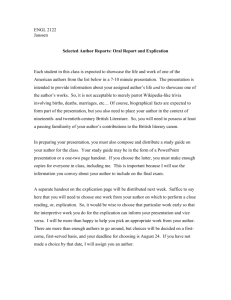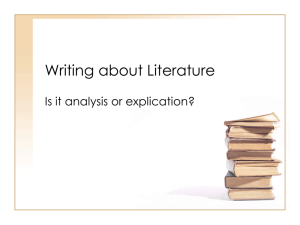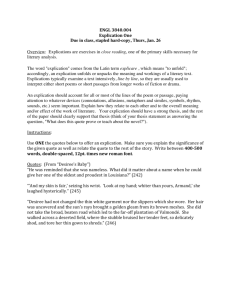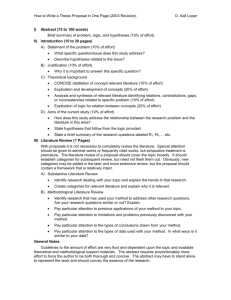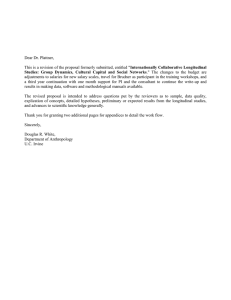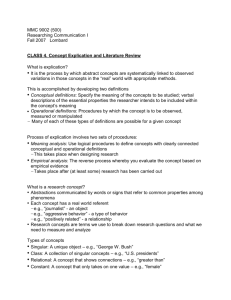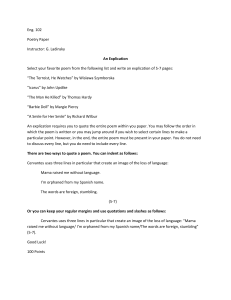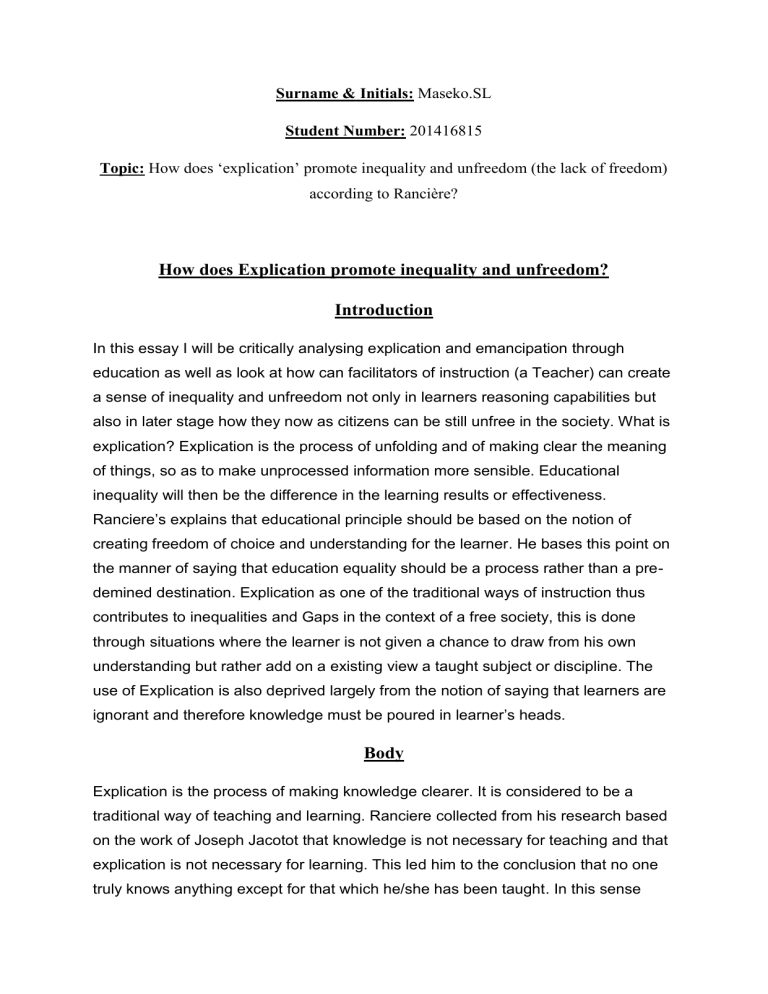
Surname & Initials: Maseko.SL Student Number: 201416815 Topic: How does ‘explication’ promote inequality and unfreedom (the lack of freedom) according to Rancière? How does Explication promote inequality and unfreedom? Introduction In this essay I will be critically analysing explication and emancipation through education as well as look at how can facilitators of instruction (a Teacher) can create a sense of inequality and unfreedom not only in learners reasoning capabilities but also in later stage how they now as citizens can be still unfree in the society. What is explication? Explication is the process of unfolding and of making clear the meaning of things, so as to make unprocessed information more sensible. Educational inequality will then be the difference in the learning results or effectiveness. Ranciere’s explains that educational principle should be based on the notion of creating freedom of choice and understanding for the learner. He bases this point on the manner of saying that education equality should be a process rather than a predemined destination. Explication as one of the traditional ways of instruction thus contributes to inequalities and Gaps in the context of a free society, this is done through situations where the learner is not given a chance to draw from his own understanding but rather add on a existing view a taught subject or discipline. The use of Explication is also deprived largely from the notion of saying that learners are ignorant and therefore knowledge must be poured in learner’s heads. Body Explication is the process of making knowledge clearer. It is considered to be a traditional way of teaching and learning. Ranciere collected from his research based on the work of Joseph Jacotot that knowledge is not necessary for teaching and that explication is not necessary for learning. This led him to the conclusion that no one truly knows anything except for that which he/she has been taught. In this sense explication is not necessary for learning to take place. The explication order is considered as the knowledge from the book to the teacher to the learner. This in itself constraints the learner from creating a new dimension or understanding of the given information and does not necessarily promote equality but rather unfreedom, Knowledge is presented on to the learners and it is supposed to be taken as the gospel truth. Therefore learners end up replicating the teacher’s understanding of the information rather than formulating their own. Explication then in greater sense become the core of social inequality as learners are taught as much as the teacher wants them to know, rather than enabling them to freely formulate their own views and understanding. Rancière when studying Joseph Jacotot discovered that this use of explication which at times was seen as liberating is in actual sense a main contributor to a society which is unequal. One of the constructivist theorists Reuven Feuerstein stated that “All learners can learn, irrespective of age or stage of development that they are in” and that “All individuals can change the way they think and learn at any stage”. Joseph Jacotot proved the same pedagogy’ of learning without explication when he used experiments that lead him to realise the value of learners creating understanding. Jacotot had a language barrier in his classroom when he had to instruct his leaners but found that they were not speaking the same language, Therefore limiting the learners from what he wanted them to know Jacob then discovered that by leaving the students to themselves with a book of knowledge he could then wait for the understanding which the learners picked u or themselves. It is my view that the uses of this experiment lead to the realisation in educational terms which shy’s away from the aspects such as Indoctrination. By using pedagogies which will allow people to use their minds freely, to create minds which will not be oppressed by the cornered off knowledge that they get “brainwashed” with. It will enable a person to go beyond than that which is presented to them and fight against oppression, therefore rendering all as equally intelligent and in extension creating a society of citizens who are aware of what they want to achieve. When an individual are taught the power of drawing their own understanding then it easy to free themselves from control and allows them to control their own minds and knowledge. The role Explication has played its role in South African education history and the evolution of it. Steve Biko in I write what I like touches on those aspects which show that even then explication was used as tool to oppress the disadvantaged black students from acquiring and learning the information that they needed to learn in order to liberate themselves. Steve Biko in one of his letters wrote “It seems sometimes that it is a crime for the non-white students to think for themselves.” What Biko was stating was that the Apartheid system then did not allow for Black students to be in a position where they could draw their own understanding, everything had to be explained to them and their own thinking was not allowed. Thus it created unfreedom in terms of opportunity and equality. Conclusion It is noted by me that Explication does more harm than good. Although at times it may seem like Explication is the only way to Teach, Instructors should engage more time in trying to find out other pedagogies which must in fact promote liberation teaching rather than prescribed teaching. The teacher should situations and a teaching and learning environment where the teacher does not become a dominant supplier of knowledge but rather a helper in letting learners formulate their own understanding. By moving away from this way of using explication then we would be moving in a manner of creating a society which has citizens which can fully understand situations from their own perspective either than be indoctrinated or be in a position where they are made to believe in others theories. Word Count: 986 words Bibliography Biko, S. (1987). I write what I like. Oxford: Heinemann. Freire, P. (1993). Pedagogy of the oppressed. New York: The Continuum International Publishing Group Ltd. Jacques Rancière. 1981. The Ignorant Schoolmaster, Five Lessons in Intellectual Emancipation. Standford, California. Stanford University Press
